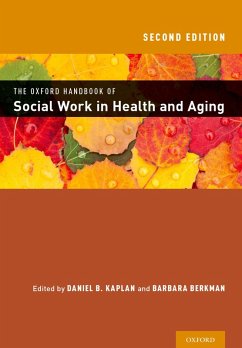
The Oxford Handbook of the Sociology of Disability (eBook, PDF)
Versandkostenfrei!
Sofort per Download lieferbar
86,95 €
inkl. MwSt.
Weitere Ausgaben:

PAYBACK Punkte
43 °P sammeln!
The Oxford Handbook of the Sociology of Disability provides a timely and comprehensive overview of the wide range and depth of sociological theory and research on disability-brought together for the first time in one volume. Each section of the Handbook incorporates a uniquely sociological perspective, presented by a wide-range of experts on intersecting social, economic, political, and cultural dimensions of disability, that complements disability scholarship. The 37 chapters in this Handbook, organized into three major sections, provide an assessment of the history of the field, its current ...
The Oxford Handbook of the Sociology of Disability provides a timely and comprehensive overview of the wide range and depth of sociological theory and research on disability-brought together for the first time in one volume. Each section of the Handbook incorporates a uniquely sociological perspective, presented by a wide-range of experts on intersecting social, economic, political, and cultural dimensions of disability, that complements disability scholarship. The 37 chapters in this Handbook, organized into three major sections, provide an assessment of the history of the field, its current state, and the future for research on and in the sociology of disability. The first section reviews frameworks foundational to the study of disability, pushes for the inclusion of broader global perspectives, and addresses important dimensions of representation. The second section presents a combination of perspectives that tie together individual biography, societal contexts, and historic change, while emphasizing continuity and change in the dynamic processes linking individuals, institutions, and structures over time. In the third section, contributors investigate the reproduction of inequality through law, policy, and related institutions and systems, while highlighting how social and political participation empowers people with disabilities and helps to mitigate inequalities and social marginalization. The chapters included in this volume offer a multifaceted resource for students and experienced scientists alike on historical developments, main standards, key issues, and current challenges in the sociological study of disability at the global, national, and regional levels.
Dieser Download kann aus rechtlichen Gründen nur mit Rechnungsadresse in A, B, BG, CY, CZ, D, DK, EW, E, FIN, F, GR, HR, H, IRL, I, LT, L, LR, M, NL, PL, P, R, S, SLO, SK ausgeliefert werden.













